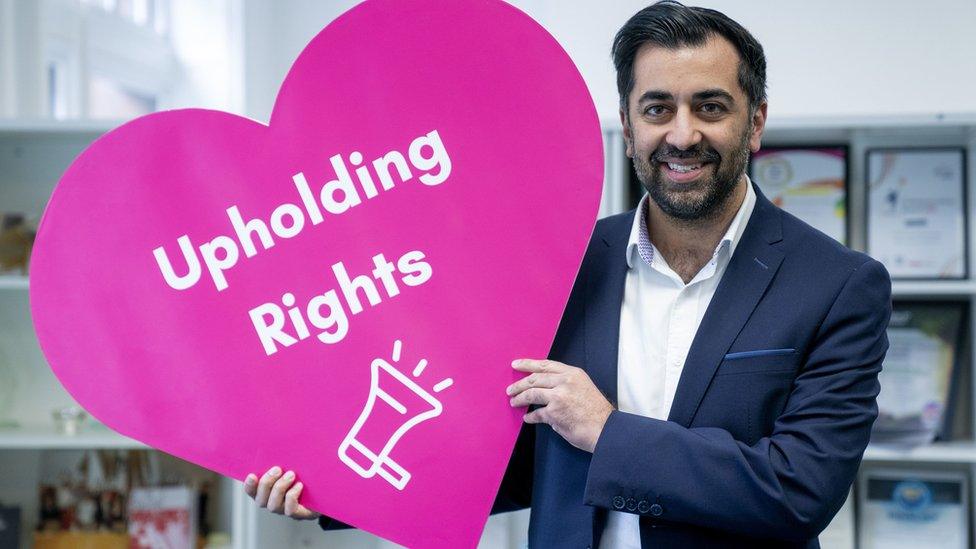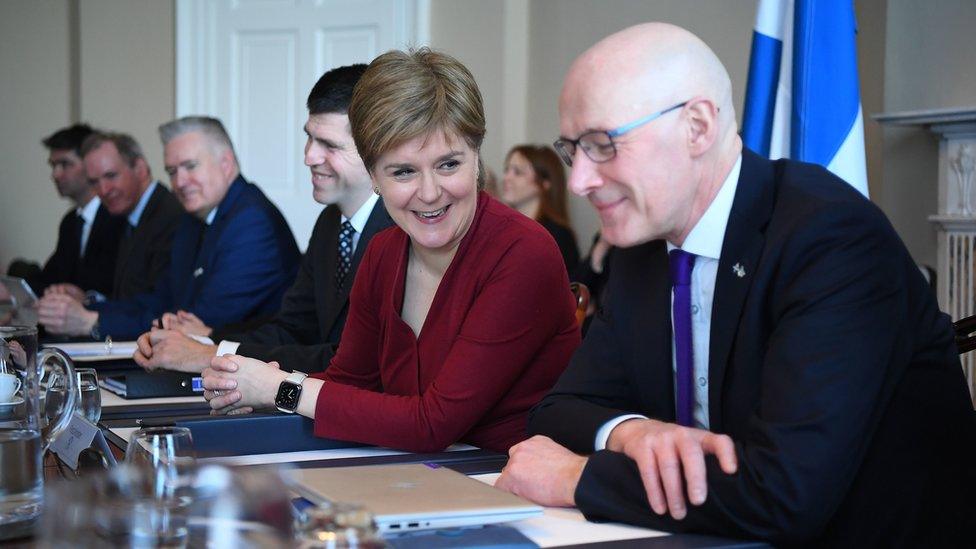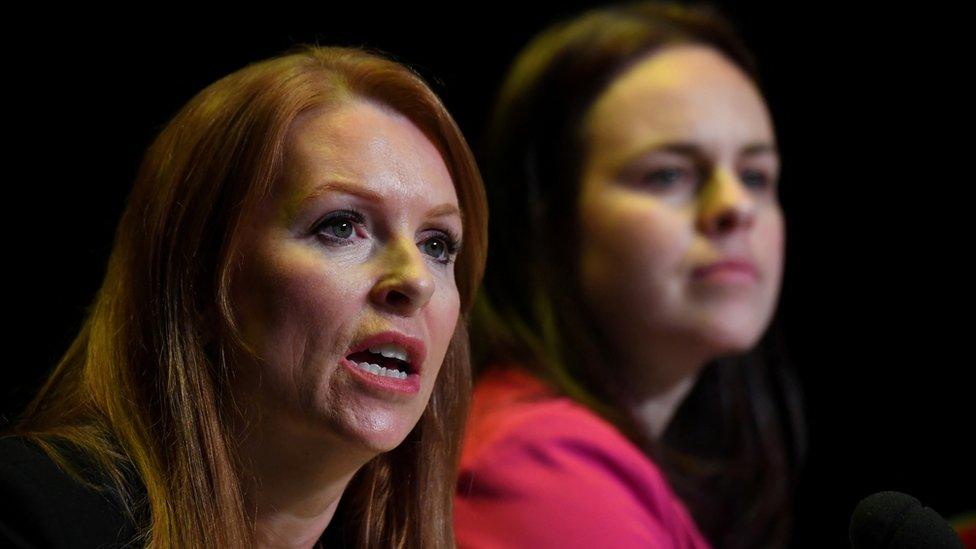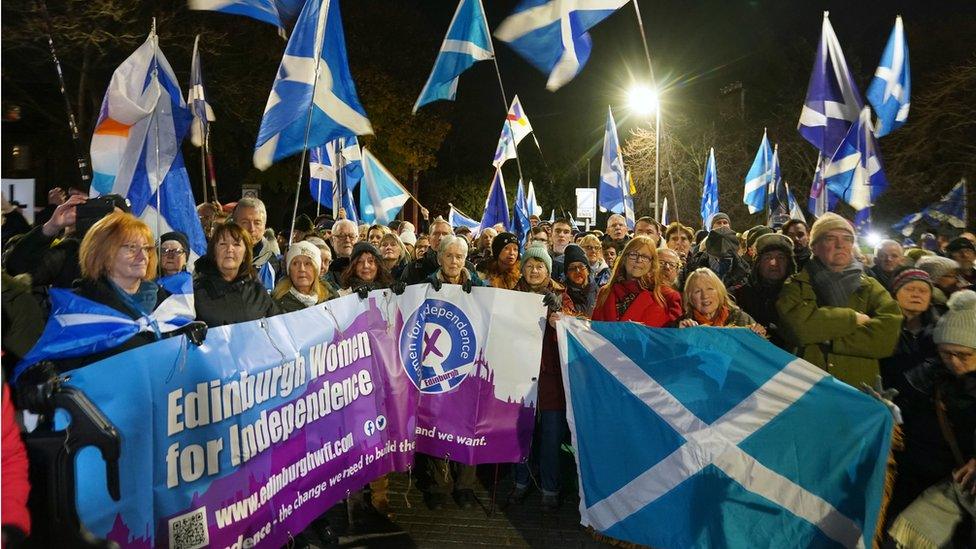SNP leadership: Humza Yousaf would follow legal advice on gender challenge
- Published

Mr Yousaf has stressed his commitment to "progressive values" throughout the leadership campaign
Humza Yousaf says he would only challenge the UK government block on Scotland's gender reforms if legal advice suggests it would be successful.
The SNP leadership candidate has previously been unequivocal in his support for Nicola Sturgeon's pledge to fight the veto in the courts.
But he has now said it would not be responsible to do so if there was no chance of success.
Mr Yousaf said there was no contradiction between these positions.
His two rivals, Ash Regan and Kate Forbes, have both said they do not want a legal fight with Westminster over the issue.
Mr Yousaf has been seen as the "continuity candidate" in the leadership race, with the health secretary widely viewed as being Ms Sturgeon's preferred successor.
He has the backing of the party hierarchy, including outgoing Deputy First Minister John Swinney, and has faced accusations - which he and the party deny - that the election process has been specifically designed to help him win.
As the SNP became engulfed in the turmoil that saw Ms Sturgeon's husband Peter Murrell quit as chief executive at the weekend, the health secretary has been attempting to convince voters in the contest that he is his own man.
He has previously criticised his opponents for not being willing to mount a legal challenge over the Section 35 order the UK government issued in January to block the Gender Recognition Reform (Scotland) Bill.
He told the STV debate earlier this month that he was "the only candidate who will stand up to Westminster's power grab", despite the controversy over the issue.

Ms Sturgeon and Mr Swinney both attended their final cabinet meeting on Tuesday before they stand down next week
Mr Yousaf sounded more cautious as the three candidates took part in the final debate in the leadership race, which was hosted by Times Radio on Tuesday evening.
Stressing the importance of taking legal advice before mounting a challenge to the Section 35, the former justice secretary said: "If you get an unequivocal answer from your lord advocate that this cannot be won, you would do the responsible thing and not take that to court".
Speaking to the BBC's Good Morning Scotland programme on Wednesday, Mr Yousaf said that the "first principle" of any SNP leader and first minister should be to "challenge a Westminster veto on our legislation".
He added: "A first minister has to act on the legal advice that they are given - that almost goes without saying.
"If the legal advice is that there is simply no stateable case whatsoever, then of course that would have to be taken into consideration.
"But my starting principle has not changed. My starting principle is very much the case that we should challenge that Section 35 order."
Mr Yousaf initially said that "of course" he had not seen any legal advice on the issue despite sitting in Ms Sturgeon's cabinet, before later saying that he "can't go into the detail of legal advice" as "we don't discuss legal advice".



Ms Forbes, who has longstanding concerns about allowing people to self-identify their gender, told the Times Radio debate that she agrees with reforming the Gender Recognition Act, despite having previously said she would have voted against the bill in its present form if she had not been on maternity leave at the time.
However, she said she was "not spoiling for a fight for the sake of it" and the legal advice therefore "really does matter".
The finance secretary has previously said she would amend the legislation to ensure it cannot be blocked again, but it is not yet clear what those amendments would be.
Ms Forbes said: "We can either go to court against legal advice and spend money that could be used elsewhere in a cost-of-living crisis, or we can take that legal advice and make the decision on the back of that.
"If there is no alternative to court, I'll go to court, but I think there is an alternative to court."
Ms Regan, who has been the most vocal critic of the gender reforms and quit as community safety minister in protest, said that any legal challenge would be doomed to fail.

Ms Regan (left) and Ms Forbes have both said they do not want to go to court over the gender reforms
She added: "I don't think that shows us standing up to the UK government. I think that is something that you want to do for things where you have the public behind you."
The debate also saw the three candidates criticise the failure to build a stronger case for independence during Ms Sturgeon's eight years in office.
Recent polls have suggested that support for independence remains at broadly similar levels to when Ms Sturgeon replaced Alex Salmond as first minister and SNP leader after the referendum in 2014.
Ms Forbes argued that the "groundwork has not been done", and that more effort should have been put into trying to win over people who are currently opposed to independence.
She was backed by Mr Yousaf, who claimed that there had been too much focus on criticising Westminster rather than setting out a positive vision for independence.
Ms Regan also criticised the failure to build momentum, and said she would set up an Independence Convention which would bring together all of the various Yes parties and groups to drive forward the campaign.
The result of the SNP leadership contest, which is being decided by a vote of party members, will be announced next Monday.
The winning candidate will then face a Scottish Parliament vote the following day before being confirmed as the country's new first minister.

The three candidates said there had been a failure to build support for independence in recent years
Ms Sturgeon has insisted that she is leaving a "brilliant foundation" for her successor to build on, despite the deep divisions within the party that have been exposed since her sudden announcement that she was departing.
She has dismissed claims from some within the SNP that the party is currently "a mess" and said it was merely going through "growing pains".
Her husband, Mr Murrell, quit on Saturday after admitting responsibility for the media being given misleading figures for how many people were eligible to vote in the contest.
The party's media chief, Murray Foote, also resigned over the row.
The SNP consistently claimed to have more than 100,000 members, with Mr Foote rubbishing reports that 30,000 people had left the party as "drivel".
But it was finally forced to admit that its membership currently stands at 72,000 - down from 104,000 in December 2021 - after both Ms Regan and Ms Forbes questioned the integrity of the election process.
Ms Regan has called for the party to allow members who had already voted in the contest to be allowed to edit their ballot in the wake of the turmoil.